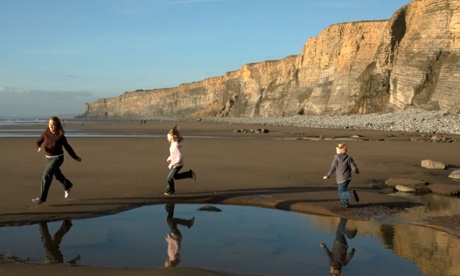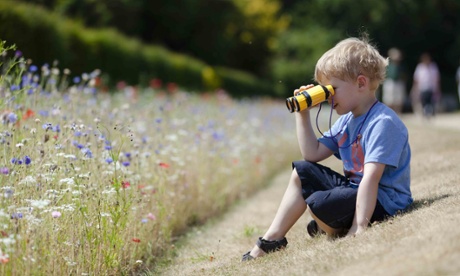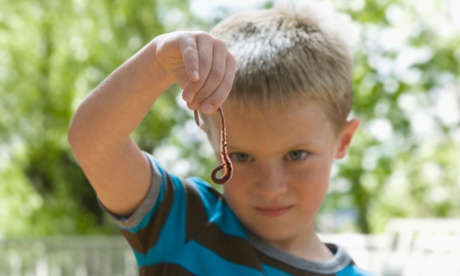
I grew up on a farm on the edge of Nowheresville, Hampshire. I was a speccy, geeky kid who loved experimenting with nature.
While most of the people at school were experimenting with drugs or each other, drinking copious amounts of cider and getting pregnant, I was experimenting with frogspawn.
I was fascinated by the stuff.
I kept a frogspawn collection well into my teens, trying to raise tadpoles in the water tanks on my parents’ farm. One summer, I tried to see what would happen if you fed tadpoles different types of food. Tadpoles, it turns out, don’t like wafer thin ham.
Now I work for the National Trust, coordinating our efforts to reconnect children with outdoors. I’m the reason why ‘finding frogspawn’ has found its way on to our list of 50 things to do before you’re 11 ¾. The 50 things range from the very simple, like climbing a tree or running around in the rain, to the more complicated, like abseiling or going on a nature walk.
The 50 things are adventures that can be done wherever, by anyone – well, you’ll need a beach, a tree, some snow or hills for some of them.
These things should be enjoyed by every child. Not just those who can get to a trust property.
It matters because the problem we’re trying to do something to solve with 50 things is so, so, so much bigger than the trust.
Children in the UK have never been more disconnected from nature and the outdoors.
We’ve all heard these phrases:
“It’s not like it was in my day.”
“We used to get thrown out of the house in the morning and didn’t come back till tea time.”
“All kids do nowadays is play computer games.”
We wanted to find out whether or not there was any fact behind them.
So two years ago now we commissioned the author, broadcaster and colossus of the BBC Natural History Unit, Stephen Moss, to delve into what everyone was thinking: that children are retreating further and further from nature.
What Stephen found worried us.
The Natural Childhood report painted a bleak picture of children’s connection with nature.
Roaming radiuses have shrunk by 90%.
The number of kids who regularly go to their local ‘patch of nature’ has halved in a generation.
9 in 10 kids can spot a Dalek when they see one. Yet a third of kids can’t identify a Magpie.
And as children’s contact with nature is slowly exterminated, they’re getting unhealthier, unhappier and less able to take risks.

There are some hefty barriers standing between today’s children and a healthy natural childhood. The report lines up busy roads, health and safety culture, ‘stranger danger’, a society geared up to see kids and teens in parks as antisocial yobs… The list goes on. And it doesn’t hold back when it comes to the part played by big conservation organisations like the National Trust. We’re too stuffy; too old fashioned. We’ve made nature into something that can only be experienced on reserves, through binoculars or on David Attenborough programmes.
The report made it plain: something needed to change. We couldn’t just sit back and let children become any less connected to nature.
And there’s an extremely good reason why.
We need nature. We really need nature.
There are stacks of studies demonstrating a link between access to quality green spaces and improved concentration and behaviour, better health and increased environmental awareness.
And yet, we don’t really need the science – do we? We know that being in green spaces is good for us. You just need to go and run around in a park for a bit and feel the benefits. You don’t need to sit around by the computer reading back issues of the British Medical Journal.
I can see it with my own daughter. I’m mother to Ella, an twenty-one month old girl who likes drawing pictures of bugs and making a mess. She’s not all that keen on mud. Despite my best efforts she’s always held back when it comes to getting her face dirty or splashing in puddles.
Just recently I’ve been taking her to a forest school on the outskirts of Bath. The first time we went she wasn’t sure what to make of it. She stood on the edge of the group and I really had to push her to get involved.
Which is why what happened at our second session was so remarkable.
Suddenly, after being so reticent at the first session, she got it. She and her friend Lucas were having a whale of a time, making figures from sticks, flicking mud at each other and giggling like a pair of fishwives. She got filthy. I couldn’t get her home at the end of the session. She stood there, mud plastering her face, frowning.
“NO, MUMMY!” she huffed. “MORE FOREST. MORE FOREST.”
That's what time in the outdoors does. It’s transformative. You see children who hold back, who aren’t sure about things become different people. They run; they play; they explore.
And all this running, playing and discovery isn’t just helping children’s own personal development or making them healthier human beings.
There’s a bigger net gain.
People who spend more time outdoors as kids are the ones who have a stronger interest in environmental issues and protecting the planet.
My daughter’s generation will be one dominated by a changing climate, by population increases and growing pressure on resources like food, water and green space. It seems pretty obvious to me that we should be doing whatever it takes to make sure that their decisions are informed by a love for the environment.
And that means exposing them to the outdoors. As Sir David Attenborough once said, “no one will protect what they don’t care about, and no one will care about what they have never experienced.”

It’s not as if I’m alone in thinking that children in this country should enjoy a more natural childhood. Just last month Chris Packham told a Radio Times journalist that "the children out in the woods, out in the fields, enjoying nature on their own - they're extinct.”
“Risk aversion is killing childhood”, he said.
Which is a complete load of rubbish.
Saying things like “risk aversion is killing childhood” or “cor, isn’t ‘elf and safety a bad thing?” is just a lazy way of abdicating responsibility. Of passing the buck. Of blaming other people because you’re not brave enough to do something about it.
But worse than that, it feeds the feeling that it is dangerous out there for kids.
Just because we’ve all heard stories about a school stopping games of conkers or police pulling down children’s woodland dens, doesn’t mean that it’s happening everywhere.
It’s the availability heuristic. We can imagine something happening – or we’ve seen a news article about it – so we scale it up in our minds till it becomes all encompassing. Then we base our judgements on the example or case that leaps to mind.
It’s perfectly normal for us to want to protect our children. To stop them from doing things that might cause them hurt or injury.
What I’m worried about is when normal becomes norm: when we don’t think that it’s a cause for concern that there are no children playing out on streets; when we don’t think it’s bad that children can name their favourite tellytubby quicker than their favourite bird.
Risk aversion is, as Spike Milligan said, “all in the mind”. I don’t want what’s in the mind to irrevocably change the situation on the ground. I don’t want gloom-laden phrases like “risk aversion is killing childhood” to become self-fulfilling prophecies. I don’t want to wake up in 20 years’ time to find that children have disappeared from the outdoors, environmental literacy has shrunk to zilch and the only glimpse people have of a starling is on old re-runs of Springwatch.
There is a way of defying a risk averse culture. And guess what, folks, it’s about taking risks.
Odd as it might sound, we want to give children permission to get outside and make mud pies, plant things and race snails. In fact, we want to give parents permission, too, because often it’s the parents who need persuading. Once they get out and do it, kids love to play outdoors. It’s the parents who have said no.
And we’re not stupid. We’re not trying to drop kick childhood back into a golden neverland of 1950s bliss. We know that computer games are fun – that they can in fact benefit kids in all sorts of ways. That’s why we’re using the web to engage children and their families.
We need to make nature cool. We need to make it desirable.
So the next speccy kid experimenting with tadpoles and unsuitable foodstuffs on a quiet Hampshire farm isn’t seen as geeky or weird, but wild.
That's when it’s mission accomplished.
